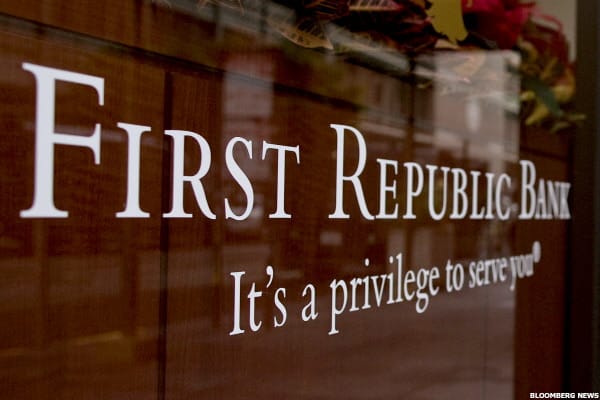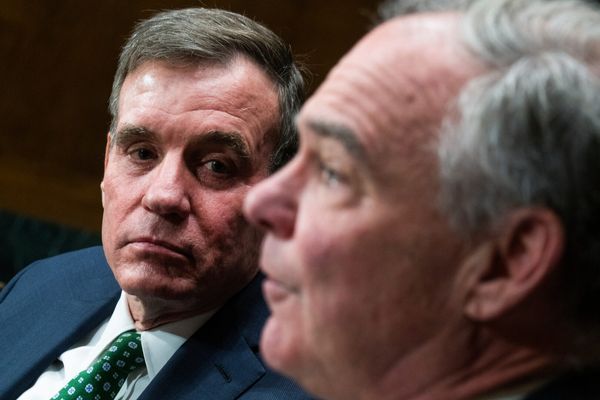
First Republic (FRC) shares were halted from trading again Friday, after resuming their recent slump, following a coordinated rescue of the San Francisco-based lender late Thursday was marred by concerns over the strength of its balance sheet.
Credit Suisse shares were also firmly lower in Zurich, following data showing a surge in outflows from its managed funds earlier this week and a downgrade of its credit rating to the edge of 'junk' status by DBRS Morningstar.
First Republic said in a Securities and Exchange Commission filing that its cash position was pegged at around $34 billion prior to the promise of an additional $30 billion from a consortium of 11 banks lead by JPMorgan Chase (JPM) CEO Jamie Dimon in coordination with the Federal Reserve and the U.S. Treasury.
The group also said it had borrowed $119 billion over the past week from both the Fed's new lending backstop program and the Federal Home Loan Bank at a rate of 5.09%
Around 70% of its deposits are uninsured, as well, given it deals with wealthy individuals whose savings top the $250,000 limit set by the Federal Deposit Insurance Corp.
Late Thursday, a collection of the biggest U.S. banks agreed to deposit as much as $30 billion in First Republic, agreeing to leave the cash for at least 120 days while earning the same daily interest as current First Republic clients in an effort to shore-up confidence in the broader financial system.
"Their collective support strengthens our liquidity position, reflects the ongoing quality of our business, and is a vote of confidence for First Republic and the entire U.S. banking system," CEO Mike Roffler and chairman Jim Herbert said in a joint statement. "In addition, we want to share our sincerest thanks to our colleagues, clients, and communities for their continued and overwhelming support during this period.”
Even with that collective support, alongside pledges and statements from U.S. authorities -- including Treasury Secretary Janet Yellen -- banks appear to remain deeply concerned over the threat of contagion from the collapse of Silicon Valley Bank and Signature Bank last week and the steep declines for First Republic over the past few trading sessions.
SVB Financial, the parent of Silicon Valley Bank, filed for Chapter 11 Bankruptcy protection in New York Friday, citing debts of around $3.3 billion and an estimated $2.2 billion in liquidity.
Fed data published late yesterday showed that U.S. financial institutions borrowing a record $152.8 billion from its Discount Window over the week ending on March 15, a massive leap from the $4.58 billion taken out during the prior period and a tally that tops the global financial crisis peak of $111 billion notched in the autumn of 2008.
First Republic shares, which ended the Thursday session 10% higher but were halted from trading 17 times, were marked 26% lower in early afternoon trading Friday to change hands at $25.30 each after they were briefly halted from trading on the New York Stock Exchange.
U.S. bank stocks were also moving south, with JPMorgan falling 3.75% to $125.85, Citigroup (C) down 3.1% to $44.20 and Bank of America (BACXL) falling 4.2% to $27.76 each. Goldman Sachs Group was marked 2.9% lower at $305.87 and was the biggest drag on the Dow Jones Industrial Average.
"The market is taking time to price in the actions that have been taken by regulators but also by the biggest banks," U.S. Deputy Treasury Secretary Wally Adeyemo told CNBC Friday. "What we've done now, because of liquidity facilities, is given the institutions to think through how they organize their businesses going forward."
Credit Suisse shares, meanwhile, were marked 11% lower in Zurich at 1.80 Swiss francs per share following yesterday's move by the Swiss National Bank to offer a $54 billion lifeline of loans and liquidity support to the troubled lender, and on pace for their biggest weekly decline since 2008.
However, in a sign that suggests authorities in Europe remain worried over the threat of contagion, risk supervisors at the European Central Bank held an emergency meeting in Frankfurt Friday to discuss both the Credit Suisse situation and the ongoing crisis in the U.S. banking sector.
Morningstar data has also indicated that more than $200 million has been pulled from funds managed by Credit Suisse since March 14.
Europe Raises Interest Rates; What Will the Fed Do?
Still, yesterday's move by the ECB to lift its three benchmark interest rates by 50 basis points, even in the face of a simmering financial crisis, suggests that monetary authorities are comfortable -- for the most part -- in leaving the financial system to repair and stabilize itself.
"I was around in 2008 (during the global financial crisis) so I have clear recollection of what happened and what we had to do," ECB President Christine Lagarde told reporters in Frankfurt following the central bank's interest rate decision. "I think that the banking sector is currently in a much, much stronger position than where it was back in 2008."
"Added to which: if it was needed, we do have the tools, we do have the facilities that are available and we also have a toolbox that has other instruments that we always stand ready to activate if and when needed," she said.







